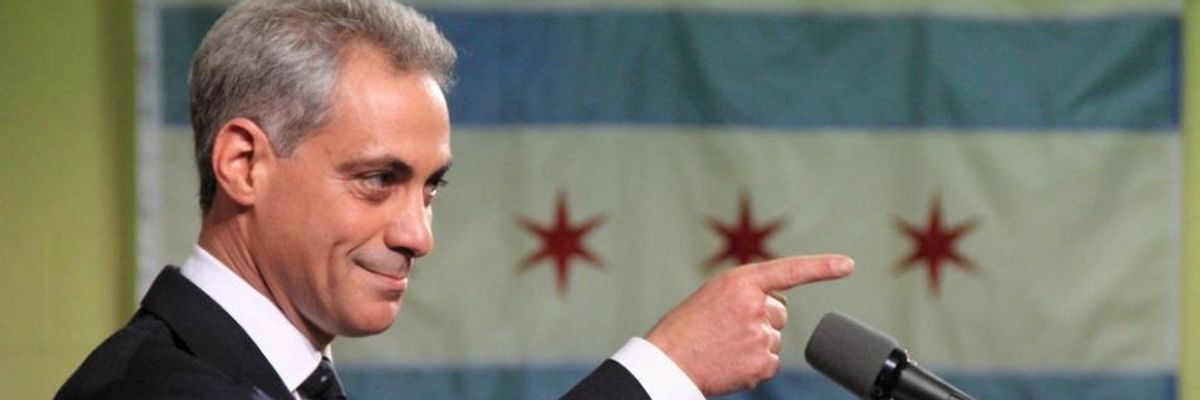Chicago's historic mayoral runoff vote, which became a nationwide symbol of the contest between the political machine and people power, ended late Tuesday in a second term for the man dubbed "Mayor One Percent"--and with vows from grassroots groups that, far from being defeated, their organizing will only grow from here.
Possessing what Chicago Tribune reporter Bob Secter described as a "multimillion-dollar campaign war chest," Emanuel outspent rival Jesus "Chuy" Garcia four-to-one and wielded significant political power during the election, thanks to his former tenure as a chief of staff for President Barack Obama, former membership in U.S. Congress, and broad backing from the city's establishment and media.
Garcia, a Cook County Commissioner, had broad support from unions and community organizations, who mobilized in an attempt to oust Emanuel, whose track record has been derided as heartless, racist, and authoritarian.
Despite these efforts, the Chicago Tribuneis reporting that Emanuel took approximately 55.7 percent of the vote Tuesday, with Garcia coming in at 44.3 percent. However, with 1.4 million registered voters in Chicago (far below the number of residents in the city), the people who actually voted for Emanuel represent less than a quarter of the electorate.
Furthermore, Chicago-based author and journalist Rick Perlstein reported on Tuesday that several voters said they had received ballots already marked for Emanuel, while there were no known reports of irregularities favoring Garcia.
Analysts and activists say that the fact that the runoff happened at all is testament to broad discontent with Emanuel's first term. Emanuel was forced into Chicago's first ever mayoral runoff after he failed, despite his clout, to capture 50 percent of the vote in February.
During his tenure, Emanuel oversaw the mass shuttering of public schools, which disproportionally impacts poor people and communities of color, and cracked down on educational workers' rights, prompting the Chicago Teachers' Union's first strike in 25 years in 2012. He also installed controversial red light cameras, which have been slammed as a regressive tax on people who cannot afford it.
Emanuel repeatedly rebuffed community organizations demanding reparations and accountability for the city's proven history of police torture, as well as a recently-exposed police 'black site' known as Homan Square. And he is known among activists for his insulting attitude towards the most marginalized communities, accompanied by his drive to further transform Chicago into a city for the rich.
"We are coming out of this election with the attitude that now more than ever we need to build a mass movement," Frank Chapman, field organizer for the Chicago Alliance Against Racist and Political Repression, told Common Dreams on Wednesday morning, "We need to go into full swing to stop police crimes in our city. This election has given the powers that be a firmer grip on their political lackeys but not a firm grip on the people."
Perlstein toldDemocracy Now! on Wednesday that, despite the Emanuel's reelection, this election has "silver linings."
"One of the strategies of Rahm Emanuel was to exacerbate tensions between the Hispanic community in Chicago and the Black community in Chicago," said Perlstein, who explained that this maneuver didn't work. Instead, he said, "you see a galvanized Hispanic population united with the African American population united with the white left and that is not going to go away."
Many say that the hotly contested election and big grassroots showing have pushed political discourse to the left and shaken up the firmly entrenched political establishment.
The group Grassroots Illinois declared in a press statement, "Tonight's election result can not erase the fact that an energized progressive coalition of teachers, working families, and grassroots neighborhood activists forced Rahm Emanuel, a paragon of Wall Street Democrats and entrenched political insider, into a runoff election, the first in Chicago history. The facade of the untouchable Rahm Emanuel and air of invincibility is gone and it is not coming back."
According to Chapman, the future of Chicago will ultimately be determined by the people who call it home.
"Politicians and elected officials do not necessarily move the agenda forward for the people," Chapman added. "The people themselves have to do that. Our faith is in the organized might of the masses, not in the promises of politicians."

